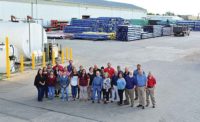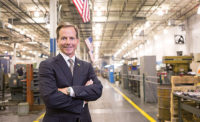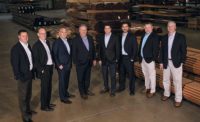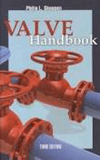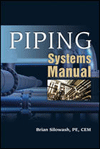2015 Supply House Times PVF Ring of Honor: Penn Machine
Penn Machine decidedly thoroughly successful.

Chairman Ron Lafferty Sr. (left) and President Joe Pro lead a Penn Machine company that has grown to three locations and more than 300 employees. Photos by Mike Miazga/Supply House Times

In his office at the company’s current Aston headquarters and manufacturing plant, Chairman Ron Lafferty Sr. Photos by Mike Miazga/Supply House Times

The US Drop Forge facility gives Penn Machine the capability to forge all its carbon and alloys in-house. Photos by Mike Miazga/Supply House Times

In addition to Chairman Ron Lafferty Sr., the company ownership group includes, from left: Chuck Lafferty (senior engineer, US Drop Forge), Charlie Lafferty (manufacturing) and Ron Lafferty Jr. (purchasing). Photos by Mike Miazga/Supply House Times

Under the direction of Branch Manager John Aaron (back row, third from left), Texas Penn Machine in Houston allows the company to better serve its customers in the Gulf Coast region. Photo courtesy of Penn Machine.

IT Manager Tony Dang (left) and Accounting Manager Mike Seaman have played important roles in the direction the company has taken on the technology front. Photos by Mike Miazga/Supply House Times






They say success can be found in the details. And that most certainly is the case for Pennsylvania Machine Works.
An extreme attention to detail, combined with an unwavering commitment to its workforce, and a willingness to adapt and embrace technology and the constantly changing needs of its customers are key reasons the Aston, Pa.-based manufacturer of forged steel pipe fittings and branch connections is the recipient of the 2015 Supply House Times PVF Ring of Honor award.
The PVF Ring of Honor award is given annually to a manufacturer or master distributor (individual or company) that has enjoyed recent success in the industrial PVF marketplace through the execution of progressive and cutting-edge best practices. Penn Machine, which celebrates its 85th anniversary in 2016, joins master distributor Industrial Valco (2014) as the first two recipients of the honor.
“Instead of battling the constant changes in our industry, we’ve embraced them,” Penn Machine President Joe Pro says. “Instead of pushing back we’ve built the infrastructure and made it our job to take the burden off the distributor. It’s a tough business. If it was easy everybody would do it. We said, it’s not easy so let’s go do it.”
One man gang
Penn Machine got its start in 1931 when Charles Lafferty Sr. started his own machine shop in a small garage location in south Philadelphia. In his office at the company’s current Aston headquarters and manufacturing plant, Chairman Ron Lafferty Sr., points to a photo on the wall that shows him and his two brothers, Charlie and Jake, in that original location in 1967. Behind Lafferty Sr. on the wall is a painted portrait of his father.
“We were children of the depression. We had to hustle to get by,” he says. “Early on we learned that if you take care of the customer everything else falls into place.”
As it continued to grow, Penn Machine moved into the current building in Aston, which has since undergone numerous expansions. In 1968 the family added its own forging facility (US Drop Forge) in nearby Swedesboro, N.J. (on the site of an old farmhouse), and in the early 1990s opened a third manufacturing facility in Houston to meet the needs of its customers in the Gulf Coast region. Today, Penn Machine, whose products primarily are used in the petro-chemical, power generation, shipbuilding, and paper and pulp industries, has more than 300 employees across the three facilities.
“If you don’t change you are dead in the water,” Lafferty Sr. says. “Only a tree stands still, but even a tree grows until it dies. A company has to move forward and change and adapt. There’s an expression from a car commercial, ‘This is not your father’s Oldsmobile.’ We have a lathe operator who has been here since the 1970s. He saw all the new technology we have and once said, ‘This is not your father’s machine shop.’”
Pillars of success
Penn Machine’s mission statement isn’t technically a mission statement — it’s called a policy. And that policy mandates consistently improved customer satisfaction, the production of world-class quality products and services that are produced and delivered in a safe, timely, efficient and environmentally compliant manner.
To Pro and the Penn Machine staff those are more than just fancy words on a website — it’s what makes the company tick. “Everybody here feels like an owner,” Pro says. “They own their responsibilities.”
Customer satisfaction starts from the moment a customer places a call that always is answered by a receptionist (there is no automated voice mail). “Each facility takes ownership of that phone call when it comes in,” Sales Manager Kevin Downs says.
Downs, who has been with the company for 38 years, is ready to jump into action with a sales staff that features many years of industry experience. Human Resources Manager Sue Watras notes 18% of the company’s workforce has more than 20 years of experience and the average tenure of a Penn Machine employee is in the 14-15-year range.
“People have a lot of trust in our sales group,” Downs says. “Because of the technical nature of the material, people want to deal with people who know what they are doing and know what’s going on in the market. Customers know if they give us an order it’s the last they have to deal with it. It will be taken care of. Customers turn to us because they trust us.”
In recent times, the company has bolstered its online presence by rolling out website loaded with product, manufacturing and quality-control information. Recent additions to the site are 3D product schematics and training modules.
“The 3D catalog gives the customer a better understanding of our products,” IT Manager Tony Dang says. “We wanted to make the website as easy to use as possible. Our job is like a pizza deliveryman, only we’re delivering information to our customers. That information has to be meaningful to our customers so they can better help their customers.”
Accounting ManagerMike Seaman points to a specific timeframe when the company turned the corner on the technology front. “Ten years ago we sat down and developed metrics to drive a strategic plan of change in terms of inventory, production and technology and that dictates where we are still going today,” he says. “Whatever we do has to be in line with what the metrics are. If the metrics don’t match up, we shouldn’t be doing it. All roads have to lead back to our customers. “
Operations Manager Brian Fabian, who started as a draftsman with the company 22 years ago, notes the simplest to the most challenging orders receive the same high priority. Having the latest technology readily available, he adds, makes it possible to best fulfill those orders.
“We do everything on our own in-house,” he says. “Everything we do is very detailed and specific. We want to handle the details and make sure the parts and processes are correct. Our people like to be challenged and want to be able to deliver a unique product to the customer.”
On the front lines
Penn Machine’s three manufacturing facilities allow it to produce high-pressure forged steel pipe fittings in all grades such as carbon, stainless, special stainless alloys, chrome moly, aluminum, copper nickels, monel, Hastelloy and numerous other exotic grades. The company has invested heavily in the latest machining and forging technologies to produce the highest-quality products that can be delivered in the timeliest manner possible to its customers. “We are blessed to have ownership that believes in investing in technology and inventory,” Pro says.
All Penn Machine products are ISO- and PED-certified, plus the company provides online material test report retrieval, positive material identification of all its alloy grades and standard electro-polishing on all stainless forged shapes, as well as 24-hour emergency service.
Consistently robust material inventory levels enable the company to tackle the most demanding and unique jobs whether it’s a single-piece odd-sized nickel alloy fitting or a 1,000-piece chrome order. At the Aston location, the company’s engineering team works on the latest product designs. That engineering team also produces all the company’s tooling materials, further maximizing manufacturing efficiencies. “Our inventory is our strength,” Pro says. “It allows us to use our forging facility and not have to depend on outside sources. We bring flexibility to the equation.”
Downs adds: “We have the oddest fitting you might want. A customer will call and ask if we have a particular odd-sized fitting on the shelf. When we say yes they are shocked and surprised. It’s why people keep coming back to us. Even if we don’t have it on the shelf, we can turn it around quickly.”
A game-changer for the company has been the evolution of its US Drop Forge facility, which sits about 12 miles across the Delaware River in New Jersey. US Drop Forge was built by the Lafferty family in 1968 and gives Penn Machine the capability of forging all its carbon and alloys in-house in sizes ranging from several ounces to in excess of 100 pounds. Dozens of grades are forged and shipped each week from the 50-employee building.
“The goal of our forge shop is to deliver the highest quality part in the shortest possible time at the lowest possible cost,” says US Drop Forge Senior Engineer Chuck Lafferty, one of the company owners along with Ron Lafferty Sr., Ron Lafferty Jr. (purchasing) and Charlie Lafferty (manufacturing). “We try not to be at the mercy of somebody else. We’ve invested in technology and invested in engineering and quality assurance. The market has changed to one that is very specification-driven. We’ve responded in like to it. Unless you stay in the forefront, you are going to fall behind. The customer writes your paycheck and it is our job to make sure that we are best fulfilling the needs of our customers.”
Down in the industrial PVF epicenter of Houston, Branch Manager John Aaron directs a Texas Penn Machine location that is undergoing a massive expansion that is due to be completed in the first quarter of 2016 and will further allow the company to provide the highest-quality service to Gulf Coast customers.
“If a customer wants it tomorrow, they will call you tomorrow,” says Aaron, who also benefits from an industry-experienced sales staff. “People need their material now. We anticipate their needs and figure out a way to make it happen. We’ve built up a large inventory and have upgraded our equipment. That allows us to provide material much more efficiently.”
Quality and safety
Quality Assurance Manager Jim Friant isn’t shy when it comes to talking about the company’s constant pursuit of quality excellence with the products it manufactures. “The documentation we have about the quality of our products is beyond reproach,” he says. “We have the supporting data and testing reports to back it up. We have decades of documentation that supports any piece that leaves this facility.”
Penn Machine also undergoes some 30 external customer audits a year — something the company welcomes. “That’s 30 extra sets of eyes and expertise,” Pro says. “The audits help us improve our operations and at the same time we get to learn more about these customers doing the audits. You’d be amazed at the amount of customers during these audits who tell us they didn’t know we stocked a particular product or all the various grades of steel. People get a chance to see the scope of what we do and it changes their perception.”
With quality comes the equally important safety component. All three of Penn Machine’s manufacturing facilities have earned the coveted OSHA SHARP certification. “We always strive to go above and beyond OHSA standards,” says Safety Manager Jim Nelms, who is the longest-non-Lafferty-family-member-tenured employee with 43 years of service (his son, Michael, is the safety manager at US Drop Forge). “If you only work to achieve the minimum, you probably won’t be good anyway.”
Nelms explains US Drop Forge had zero OSHA 300 losses in the last year and Texas Penn Machine has made it nearly five years without a lost time accident twice within the last 10 years. “We have a commitment to safety from the very top,” he says. “Ron Lafferty tells us to run safe facilities or don’t run them at all. We are constantly training our staff on the importance of safety. It’s not window dressing. Our people know it is never acceptable to take a short cut. The safety and health of our employees is of foremost importance.”
Penn Machine, which is involved in various industry best practices groups including the PVF Roundtable (where Pro is president), also employs numerous environmentally friendly initiatives such as zero discharge policies and a complete recycling program for steel, packaging materials and paper. “One of our metrics is environmental compliance,” Pro says. “All our programs are established to meet all local, county, state and federal regulations.”
Opportunity knocks
While Penn Machine boasts an employee roster that features individuals with many years of service, it also hangs its hat on a longstanding policy of providing advancement opportunities from within.
Pro started on the accounting side and later became the plant manager of US Drop Forge before moving over to company headquarters. Downs, who said he didn’t know a pipe fitting from a doorknob 38 years ago, started in the shipping department. Watras’ first Penn Machine position was as a receptionist. She then worked in a host of other departments before becoming human resources manager (she went back to school and obtained a master’s degree). Nelms began his Penn Machine career as a mechanic, while Dang started as an accounting clerk and also went back to school to earn his master’s degree in computer science. Purchasing manager Gloria Mushinski came to Penn Machine out of high school. In fact, Mushinski, who also has been a receptionist, salesperson and maintenance clerk, took eight years off to raise her children and then returned to the company.
“Almost everybody here has come up through the ranks,” Watras says. “People have started here well below where they are now and look what they’ve accomplished.”
Lafferty Sr. adds: “We build people here just like you build a building. It’s not quick and it’s not overnight. It’s labor-intensive. We invest a lot of time and effort into our people.”
Mushinski says the family atmosphere has kept her coming to work with a smile on her face for the last three-plus decades. “Even when I was not working full-time, Ron would call me and give me some jobs to do such as reupholstering chairs or coming in and scrubbing cubicles when I could,” she says. “Even though I was busy being a mom, he made sure he kept me involved. We really are a family. They put a lot of faith in their employees here. They care about you as a person.”
Lafferty Sr. admits he isn’t completely surprised at the company’s growth and success over years. “But not to this degree,” he adds. “Something like this always was a goal and I thought as long as the three brothers stayed together we could do significant things and we did. We’ve been able to do that because we take care of our people and our customers. What gets me out of bed every morning are these people. They are part of my family. We built the business from the ground up and we’re going to continue building it with the people we have. It’s in our DNA.”
Looking for a reprint of this article?
From high-res PDFs to custom plaques, order your copy today!





